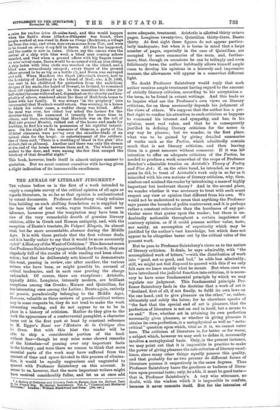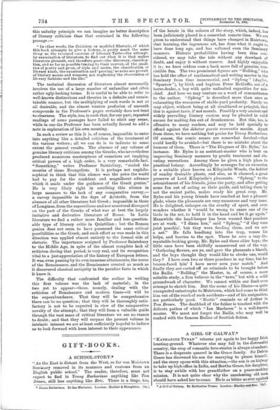THE ANNALS OF LITERARY JUDGMENT.*
THE volume before us is the first of a work intended to supply a complete survey of the critical opinion of all ages as regards literature, in so far as that opinion is authenticated by extant documents. Professor Saintsbury wisely refrains from building on such shifting foundation as is supplied by the bare titles of lost works, vague tradition, and mere inference, however great the temptation may have been in view of the very remarkable dearth of genuine literary criticism, alike in Greek and Roman antiquity, and, with the exception of Dante's tractate, De Vulgari Eloquio, its almost total, but far more accountable, absence during the Middle Ages. It is with these periods that the first volume deals, and it is hardly unfair to say that it would be more accurately styled" A History of the Want of Criticism" This does not mean that Professor Saintsbury's pages are blank, far from it ; they are singularly full of the results of wide reading and keen obser- vation; but that he deliberately sets himself to demonstrate this want, passing in review, one after another, the various writers who have been, or might possibly be, accused of critical tendencies, and in each case proving the charge unfounded. Of course, there are exceptions : Aristotle, typically Attic, Longinus, intensely modern, are brilliant exceptions among the Greeks; Horace and Quintilian, far less interesting ones among the Latins ; Dante again, entirely sui generic, paradoxically belonging to the Middle Ages, However, valuable as these reviews of pseudo-critical writers may in some respects be, they do not tend to make the work interesting reading, and do not appear to us to be in place in a history of criticism. Rather do they give to the work the appearance of a controversial pamphlet, a character borne out in the first part at least by constant reference to M. Egger's Essai • sur r Histoire de la Critique chez les Grecs. But with this hint the reader will be able to skip a considerable portion of the book without fear—though he may miss some shrewd remarks of the historian—of passing over any important facts in the history; and were there no reason to think that more essential parts of the work may have • suffered from the amount of time and space devoted to this process of elimina- tion, it would be equally ungracious and ungrateful to quarrel with Professor Saintsbury on this account. It seems to us, however, that the more important writers might have received considerably fuller, and let us at once add A History of Criticism and Literary Taste in Europe, from the Earliest Texts .the Present Day. By George Saintabary. Vol. 1., " Classical and Medistral I'llticistn." London : William Blackwood and Sons. [16a. net.]
more adequate, treatment. Aristotle is allotted thirty octavo pages, Longinus twenty-two, Quintilian thirty-three, Dante thirty. At first sight these figures do not appear particu- larly inadequate; but when it is borne in mind that a large number of pages, especially in the case of Quintilian, are occupied by mere summaries of the texts, and, further- more, that, though on occasions he can be tellingly and even felicitously terse, the author habitually allows himself ample room to develop his opinions in a leisurely and impressive manner, the allowances will appear in a somewhat different light.
No doubt Professor Saintsbury would reply that each author receives ample treatment having regard to the amount of strictly literary criticism, according to his acceptation o the term, to be found in extant writings. And this leads us to inquire what are the Professor's own views on literary criticism, for on them necessarily depends his judgment of the views of others. We suppose that the author has a per- fect right to confine his attention to such criticism as happens to command his interest and sympathy, and has, in his opinion, most real value, and that he is consequently justified in defining literary criticism for the nonce in any way he pleases; but we wonder, in the first place, what was to be gained by giving detailed summaries of works such as the Poetics, which admittedly contain much that is not literary criticism, and then leaving them in a great measure without comment. If it was his intention to offer an adequate criticism of the Poetics, he needed to produce a work somewhat of the scope of Professor Butcher's admirable treatise on Aristotle's Theory of Poetry and Pine Art ; if, on the other hand, he intended, as we pre- sume he did, to treat of Aristotle's work only in so far as it coincided with his own notions of literary criticism, why, then, confuse and mislead the reader by introducing a mass of highly important but irrelevant theory P And in the second place, we wonder whether it was necessary to treat with such scant respect any view or opinion that differed from his own. We would not be understood to mean that anything the Professor says passes the bounds of polite controversy, and it is perhaps rather a constant reiteration than the harshness of any par- ticular sneer that grates upon the reader; but there is un- doubtedly noticeable throughout a certain impatience of contrary opinion, as if it could possess neither value, taste, nor sanity, an assumption of superiority which may be justified by the author's vast knowledge, but which does not appear to be altogether borne out by the critical value of the present work.
But to pass to Professor Saintsbury's views as to the nature of literary criticism. It deals, he says admirably, with "the accomplished work of letters,"—with the distribution of work into "good, not so good, and bad," he adds less admirably; still, we might not feel disposed to quarrel with this if we only felt sure we knew exactly what he meant. But when once we have introduced the judicial function into criticism, it is neces- sary to have some fundamental principle by which we may regulate our judgment. This fundamental principle Pro- fessor Saintsbury finds in the doctrine that a work of art is "destined, first of all, if not finally, to fulfil its own laws on the one hand, and to give pleasure on the other," or, rather, ultimately and solely the latter, for he elsewhere speaks of "the fact that the special end of art is pleasure, that the perfection of literature is not an end in itself, but a means to an end." Now, whether art in attaining its own perfection necessarily gives pleasure, or whether in giving pleasure it attains its own perfection, is a metaphysical as well as " meta- critical" question upon which, vital as it is, we cannot enter here. The criticism of literature is, for better or for worse, a subject which, however we may seek to define it, necessarily involves a metaphysical basis. Only, in the present instance, we may point out that it is impossible in practice to make the power of giving pleasure the sole criterion of literary excel- lence, since many other things equally possess this quality, and that probably for no two persons do different forms of literature possess it respectively in the same degrees. Thus Professor Saintsbury bases the goodness or badness of litera- ture upon personal taste ; only, he adds, it must be good taste— that is, Professor Saintsbury's. A very wise utterance, no doubt, with the wisdom which it is impossible to confute, because it never commits itself. But for the intrusion of
this unlucky principle we can imagine no better description of literary criticism than that contained in the following passage :—
"In other words, the Criticism or modified Rhetoric, of which this book attempts to give a history, is pretty much the same thing as the reasoned exercise of Literary Taste—the attempt, by examination of literature, to find out what it is that makes literature pleasant, and therefore good—the discovery, classifica- tion, and as far as possible tracing to their sources, of the quali- ties of poetry and prose, of style and metre, the classification of literary kinds, the examination and 'proving,' as arms are proved. of literary means and weapons, not neglecting the observation of literary fashions and the like."
The technical discussion of literature almost necessarily involves the use of a large number of unfamiliar and often
rather ugly-looking terms. It is useful to be able to refer to well-known distinctions and theories in a definite and unmis- takable manner, but the multiplying of such words is not at all desirable, and the almost wanton profusion of uncouth compounds in the Professor's pages certainly does not tend to clearness. The style, too, is such that, for our part, repeated readings of some passages have failed to elicit any sense, while in one the Professor has been actually forced to add a note in explanation of his own meaning.
In such a review as this it is, of course, impossible to enter into anything like a detailed criticism of the treatment of the various writers ; all we can do is to indicate to some extent the general results. The absence of any volume of genuine literary criticism among the Greeks, who nevertheless produced numerous masterpieces of conscious art implying critical powers of a high order, is a very remarkable fact. "Something," writes Professor Saintabury, "sealed the mouths of these Evangelists. It is perhaps not unphilo- sophical to think that this silence was the price the world had to pay for the confident and magnificent advance which it made under the guidance of the Greek genius." He is very likely right in ascribing this silence in large measure to the lack of any comparative survey,— a survey impossible in the days of Aristotle, from the absence of all other literature but Greek ; impossible in those of Longinus, from the supercilious and not unnatural disregard on the part of the Greeks of what was at best the largely imitative and derivative literature of Rome. In Latin literature we find a rather more familiar and less question. able type of literary critic in Quintilian ; but the Roman genius does not seem to have possessed the same critical possibilities as the Greek, and such effort as was made in this direction was applied almost entirely to the formal side of rhetoric. The importance assigned by Professor Saintsbury to the Middle Age, in spite of the almost complete lack of criticism during that period, is very real, and its recognition vital to a just appreciation of the history of European letters. It was, even passing by its own immense attainments, the nurse of the Renaissance, and the Renaissance created as much as it discovered classical antiquity in the peculiar form in which it knew it.
The difficulty that confronted the author in writing this first volume was the lack of material; in the two yet to appear—those, namely, dealing with the criticism of Renaissance and modern times—it will be the superabundance. That they will be comprehensive there can be no question; that they will be thoroughly satis- factory is not to be expected in view of the comparative novelty of the attempt; that they will form a valuable guide through the vast mass of critical literature we see no reason to doubt; and that they will surpass the present volume in intrinsic interest we are at least sufficiently hopeful to induce us to look forward with keen interest to their appearance.



























































 Previous page
Previous page